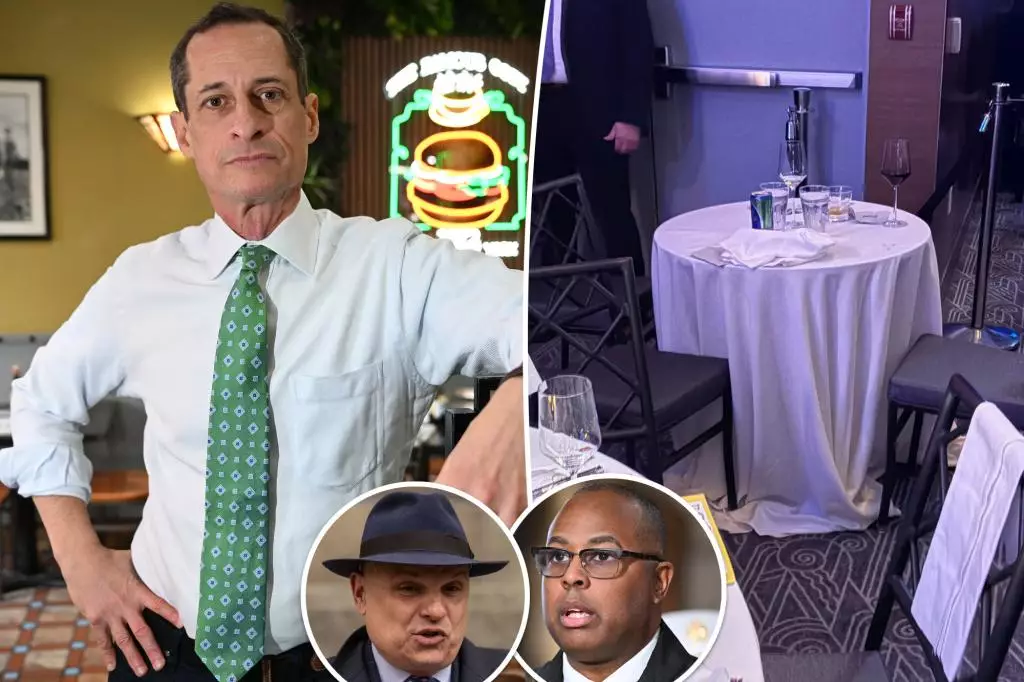New York City’s political landscapes are not just built on policies and legislation; they are also scaffolded by the elaborate social events that define the power structure of the city’s elite. Recently, the 101st Inner Circle dinner at the Ziegfeld Ballroom exemplified this truth in unexpected ways. The event, a notorious gathering of media and political figures, turned the spotlight on one attendee—former Congressman Anthony Weiner—who found himself amusingly relegated to a “kids’ table,” an incident that stirred both laughter and critical reflection.
The Comedy of Errors: Weiner’s Seating Faux Pas
In a gathering that was supposed to showcase camaraderie among political elite, Weiner’s demotion to what insiders dubbed the “small Weiner table” sent ripples through the event. Opting for humor, attendees chuckled at the irony: a man once at the forefront of political life now sat at a table meant for three, placed inconveniently close to a side exit. The nature of such seating arrangements often reflects deeper, unspoken hierarchies within the political landscape. An insider quipped that Weiner’s transfer from a larger table merely illustrated how swiftly one can fall from grace, a notion palpably present in the charged air of the ballroom.
Weiner’s reputed charisma, once potent enough to rally crowds, found little reprieve in this demotion. He initially sat with prominent figures but was eventually tapped on the shoulder to vacate his seat. Rather than engaging further, Weiner decided to leave the event early, raising eyebrows and igniting a flurry of gossip. The overall atmosphere sounded less like one of solidarity and more akin to a high school cafeteria—a microcosm of the broader social divisions that dictate political relevance.
The Inner Circle: A Theater of Political Performance
Events like the Inner Circle dinner serve not merely as ceremonial rituals but rather as theatrical performances where politicians are both the stars and the audience. Each skit, targeting figures from Mayor Eric Adams to former governor Andrew Cuomo, becomes an opportunity for rebirth or reproach; here, the laughter is interspersed with the silent acknowledgment of failures and successes. Such moments capture the essence of politics: a blend of spectacle and substance, where the lines blur, and narratives are constructed on a stage that extends far beyond the walls of the ballroom.
Interestingly, while Weiner’s table situation has become the punchline, his situation raises larger questions about redemption and the politics of acceptance. Although Weiner himself downplayed the incident and even cited familial obligation as his reason for leaving, the narrative that emerged posited that he might still be wrestling with the repercussions of his past. His friend and attorney, Arthur Aidala, suggested it was merely a logistical error, yet one can’t help but question whether it was a manifestation of a broader social rejection, a symbolic reminder of the burdensome weight of political scandal.
Power Plays and Political Friendships
Aidala’s long-standing association with Weiner shines a light on the significance of loyalty within the political realm. Despite the past drama, we see a friendship that transcends scandal—a rarity in the cutthroat political arena. Engage with a figure like Weiner, and you’re necessarily engaging with the specter of his history. Aidala’s comment that he finds Weiner “intriguing” and “really smart” opens a window into the complex human emotions that underpin political alliances. In many ways, friendships formed in the crucible of political mishap reveal a significant truth: redemption is often just a powerful ally away.
The currents of political dynamics, however, are rife with unpredictability. Aidala’s amiability towards Weiner, while impressing onlookers, simultaneously raises eyebrows—what does it mean for a public figure to ally so closely with someone who has faced such severe public scrutiny? In this way, the Inner Circle dinner illuminates the often inconsistent interplay between scandal, ambition, and personal connection. The question becomes whether societal forgiveness is attainable within the high-stakes matrix of power where personal affiliation intertwines with public perception.
The Evolving Theatre of Political Image
As New Yorkers continue to watch their political figures navigate their roles, the balance of power remains ever-volatile. Weiner’s attempt at a comeback for the City Council, although ambitious, highlights the tensions inherent in public persona—how one’s past continues to echo through present ambitions. The political arena is not merely a battlefield for policy but a stage where the personal and public intricately intertwine, often revealing truths that are more resonant than any legislative debate. In this vibrant theater of political life, seating may symbolize far more than mere logistics; it reflects the often brutal realities of belonging, exclusion, and the shifting tides of public opinion.

